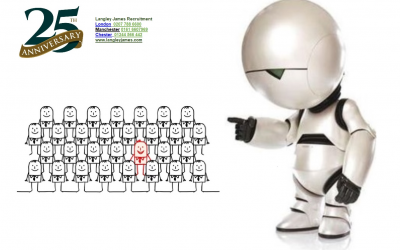The remote interview is here to stay! Despite final restrictions now being lifted, remote interviews are still the first choice for hiring managers and candidates. Not only does it give more flexibility to the candidates, but it also allows you to screen faster and in a more structured way. With the current IT skill shortage, reducing your time to hire can make a big difference when it comes to securing the best IT talent.
So how do you make sure that your remote interview structure is geared for success? Here’s our guide –
Make sure your remote interview has structure
Just as you would in a face-to-face interview, it’s important to have a structure for your remote interview. The advantage of a remote interview is that you can have an out of sight prompt to assist. Decide what’s important and what you would like to discover from each interview stage. Creating a defined structure will not only ensure that you stay on track. It will also help you communicate the process with your recruiter prior to the interview. We’ve created guides on effective interviews before and some of those tips do still apply. However, when it comes to a remote interview, there are some additional things to consider.
It’s all about communication
It’s not just the interview where communication is key. It all starts beforehand. When arranging remote interviews, it’s important to communicate what to expect. You need to share some key information with your recruiter to make sure that the candidate is prepared.
- Who will be in the interview? Will it be a team interview or individual 1-2-1`s?
- What will the candidate need to prepare? What tech will you be using? Are there any tasks to complete?
- Will you be expecting a screen share?
Making sure that the candidate is prepared in advance will allow them to showcase their skills to the best of their ability. Your recruiter should be asking you these questions as a matter of cause.
Be flexible when arranging a remote interview
When arranging remote interviews, it’s important to still be flexible. There are lots of people still working from home. But, whilst that may make you think that they are more freely available, this isn’t always the case. Companies have implemented new remote working practices and monitoring. It’s important to be mindful of this when arranging interviews. However, regardless of this, there’s no doubt that remote interviews are the quickest way to secure the best IT talent.
Test your tech
You’ve no doubt seen this discussed for candidates, but the same applies for companies – probably even more so – and especially in IT! You may be an expert at Zoom or Teams meetings now but testing that everything works before the interview is still good practice. Make sure you are in a quiet area with no interruptions. Check your battery if you are not plugged in. Simple checks can save lots of embarrassment.
Dealing with issues during the remote interview
We’ve probably all been there. We are in a virtual meeting and something really important is being said. And that’s when the connection drops out. But how do you deal with this in an interview? Whilst your connection may be working fine, sometimes you’ll be in a situation where the candidates’ connection is poor. This can be a stressful situation. Not only is the candidate nervous and trying to perform the best – they don’t want to have tech issues to deal with too. If connections are poor, then don’t waste too much time. Suggest that the interview is rescheduled for later in the day. Maybe the candidate can arrange to be somewhere with better connection?
The next steps
If you have stuck to the structured plan for each interview, then you should be able to score the candidates fairly. Identify which areas are more weighted than others. How did each candidate perform? This will help you create a shortlist for a hiring decision or a final interview. But what can you do on the second stage if it’s still a remote interview? Why not assign a task? Something that fits with a key competency for the role. Or maybe even a live task – something they will be required to do if successful.
How Langley James can help
We have been helping companies to recruit the very best IT talent for over 20 years. During this time, we have learnt lots of tips that we can share with you when it comes to interviews, attraction methods and more. If you want to work with a recruiter who really knows their market and can help you recruit someone worth recruiting, get in touch with our team today.











